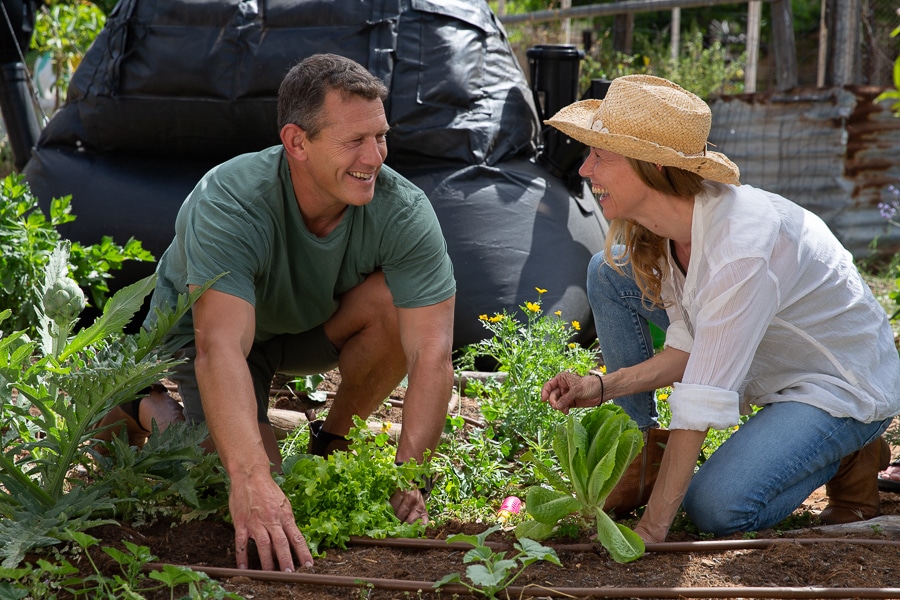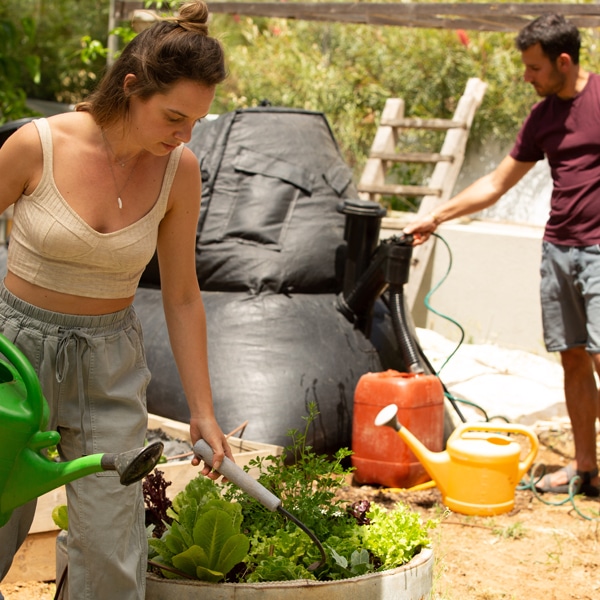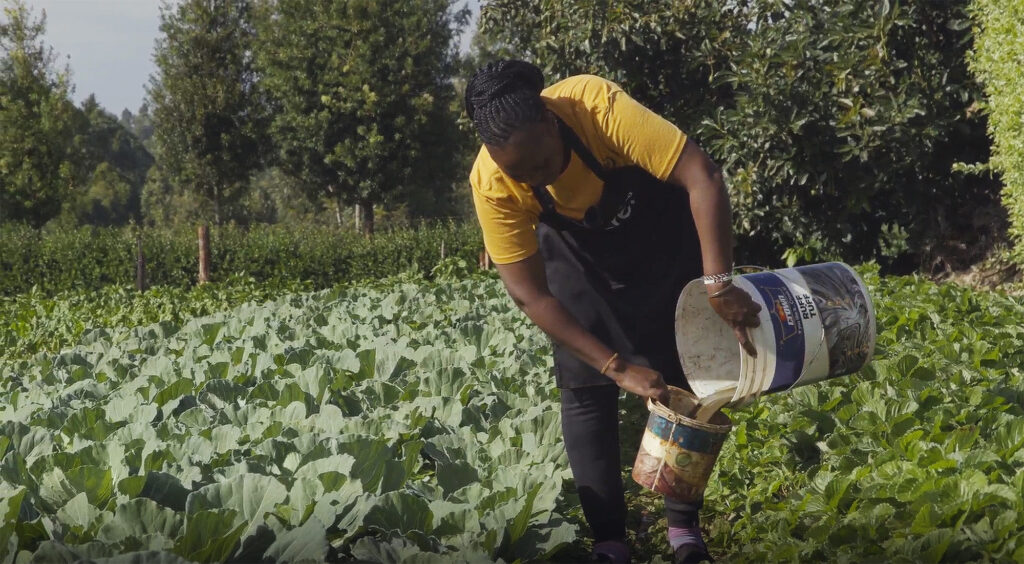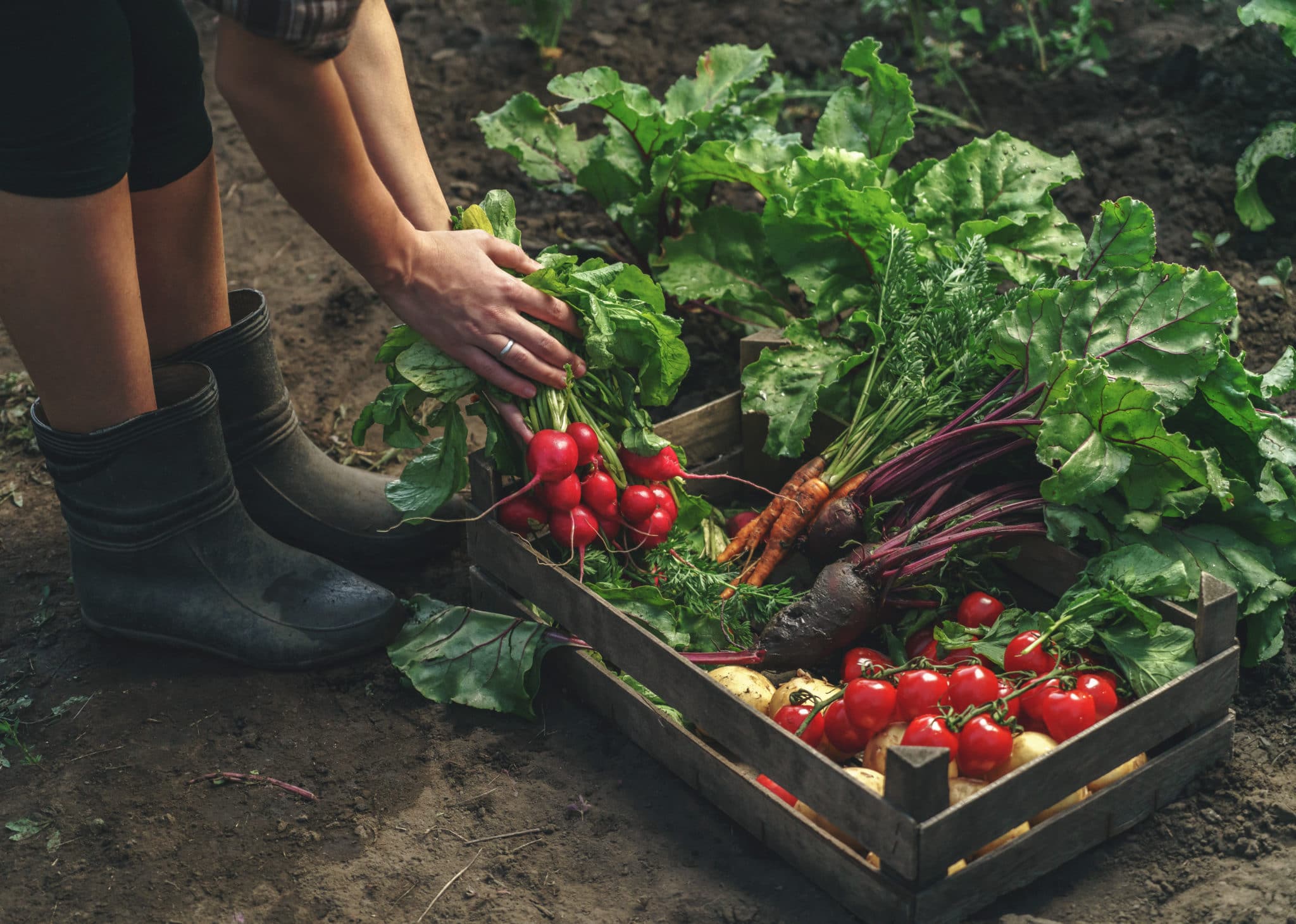
What is organic fertilizer?
The term “organic fertilizer” refers to any material that comes from natural sources and can be used to support plant growth. It is usually carbon-based, derived from plants and plant-based substances, such as agricultural by-products or animal manures.
Some of the most common examples of organic fertilizer are manure, compost, worm castings, and bone meal.
You can obtain organic fertilizer through natural chemical processes, such as:
- Anaerobic digestion – bacteria break down the organic matter in an oxygen-free environment, and from the process, you obtain amounts of methane and fertilizer.
- Aerobic digestion – organisms that decompose the organic matter get oxygen directly from the environment and generate carbon dioxide, water, and fertilizer.
Either way, you obtain a healthy mix coming from organic matter that has been minimally processed before. Typically, organic fertilizers contain various amounts of nitrogen, phosphorus, and other minerals that support plant growth, and what you use to make fertilizer will determine its exact composition.
Why is organic fertilizer good for plants?
Organic fertilizers release nutrients gradually into the soil, supporting plant growth over time. With one product, you supply your garden with both macronutrients and micronutrients, with no need for you to periodically add chemical products to the soil.
The macronutrients that most organic fertilizers contain are:
- Nitrogen
- Phosphorous
- Potassium
- Sulfur
- Calcium
- Magnesium
HomeBiogas Bio-fertilizer includes all of these micronutrients! These substances are responsible for healthy plant growth and protect flowers from diseases that can slow down their development.
On the other hand, some of the micronutrients your plants need and can take from organic fertilizers are:
- Chlorine
- Iron
- Manganese
- Zinc
- Copper
- Nickel
These micronutrients are vital for flowering, whole leaves, and predominantly yellow and green coloration.

Benefits of using organic fertilizer for your plants
Organic fertilizers provide a balance of macronutrients and micronutrients, which isn’t easy to obtain when you use chemical substances. When you use carbon-based products to fertilize your garden, you add the right quantities of nutrients to make your lawn and garden grow healthy.
Moreover, as nutrients are slowly released through natural processes, you also improve soil quality and water retention in soil.

HomeBiogas 2
Designed for the next generation of green innovation.
Last but not least, they’re a cost-effective option to keep your plants healthy. Moreover, you can make organic fertilizers at home with minimum costs—sources of organic material to start your compost pile or biogas station are relatively cheap.
Thanks to their effects on plants and the environment, organic fertilizers are becoming more and more popular among gardeners and farmers. Predictions say that the global market for these products will almost double by 2026 to reach $15.8 billion.
The Main Types of Organic Fertilizers
Organic fertilizers come from multiple sources, and the most common three types are:
- Plant-based fertilizers
- Animal-based fertilizers
- Mineral-based fertilizers
Plant-based fertilizers
Plant-based fertilizers are made from plant residue and agricultural by-products, such as green manure, molasses, cottonseed meal, cover crops, kelp, seaweed, and even compost tea.
They break down relatively fast and provide your lawn and garden with a wide range of nutrients, supporting plant growth and soil regeneration. They’re a top choice for poor soil that needs help with drainage and moisture retention.
Animal-based fertilizers
Animal-based fertilizers are made with animal manures and residues from slaughtering animals, such as bone and blood meal. These fertilizers add higher amounts of nitrogen to the soil than plant-based products. Therefore, they’re best used for leafy plants.
The most common animal-based organic fertilizer is cow manure, as its balance makes it a good source of nutrients for lawns, gardens, and vegetable gardens.
Mineral-based fertilizers
Mineral-based fertilizers are obtained through a chemical process using elements easily found in the environment. They’re necessary to rebalance the soil composition by adding one or more macronutrients.
Mineral fertilizers can also raise or lower the soil’s pH levels, depending on the amount used. They need to be used efficiently to provide good results with minimum impact on the soil’s health.
How to choose the best organic fertilizer for your plants
The best organic fertilizer for your plants is the one that matches the type of soil you have. Therefore, if you want to make a documented decision, you’ll need to test the soil to find its composition and supply the necessary nutrients accordingly.
With a test, you know:
- The macronutrients and micronutrients your soil can provide for your plants.
- What plants are more likely to thrive in your lawn and garden.
- Whether the soil is balanced and what substances you should use to regenerate it.
Depending on the soil, types of plants you grow, and their specific needs, pick an organic fertilizer that can help keep plants healthy while maintaining the soil balance and its pH levels.
The University of Maine lists the characteristics of the most common organic fertilizers to help you support soil and get better results for your lawn and garden.
5 Best Organic Fertilizers To Buy Online
1. Down to Earth All Natural Cottonseed Meal Fertilizer
Down to Earth, All Natural Cottonseed Meal Fertilizer is a good source of nitrogen, as it is a 6-2-1 formula — it includes 6% nitrogen, 2% phosphorus, and 1% potassium. Manufacturers recommend it for plants that require soil with a low pH, such as strawberries, blueberries, rhododendrons, or azaleas. Coniferous trees and shrubs can also benefit from this formula.
This organic fertilizer is also a top choice for potted plants, as it provides an appropriate amount of micronutrients to support plant growth.
2. VermisTerra – Standard Earthworm Castings
VermisTerra – Standard Earthworm Castings is a non-toxic, organic fertilizer for gardeners who don’t want to put wildlife or pets at risk. It includes all macronutrients and micronutrients plants, flowers, shrubs, and trees need to thrive.
Moreover, the fertilizer includes a series of beneficial microbes that can improve soil texture and help with water retention in soil.
3. Down to Earth Organic Greensand Fertilizer
Down to Earth Organic Greensand Fertilizer is a soil amendment for herbs, lawns, shrubs, trees, and ornamentals. It’s mainly composed of blue-green siliceous minerals from marine deposits, so it has a high amount of potassium.
It supports plant growth and protects them from disease. The downside is that this product is a slow fertilizer, so you may need to wait for one to two months before you’ll see significant changes in your lawn or garden.
4. Liqui-Dirt Nano Powder
Liqui-Dirt Nano Powder is an all-purpose fertilizer for both indoor and outdoor use. Its characteristics make it an excellent product for protecting soil and keeping balanced pH levels. The formula brings together 18 of the most popular ingredients for making fertilizer, including animal manure, bat guano, worm castings, kelp and alfalfa meal, and minerals.
The product is compatible with most plants, ideal for gardens, lawns, and potted plants. It’s a concentrated formula, so you need to dilute it with water before using it on your plants.
5. Black Kow Composted Cow Manure
Black Kow Composted Cow Manure is a 0.5-0.5-0.5 formula — it has 0.5% nitrogen, 0.5% phosphate, and 0.5% potassium. This composted cow manure breaks down slowly, providing nutrients throughout your plants’ lifecycle. It also provides the moisture-holding capacity to the soil.
It can be used successfully on all soil and plants, thanks to its composition. It’s also a suitable product for potted plants and raised beds.
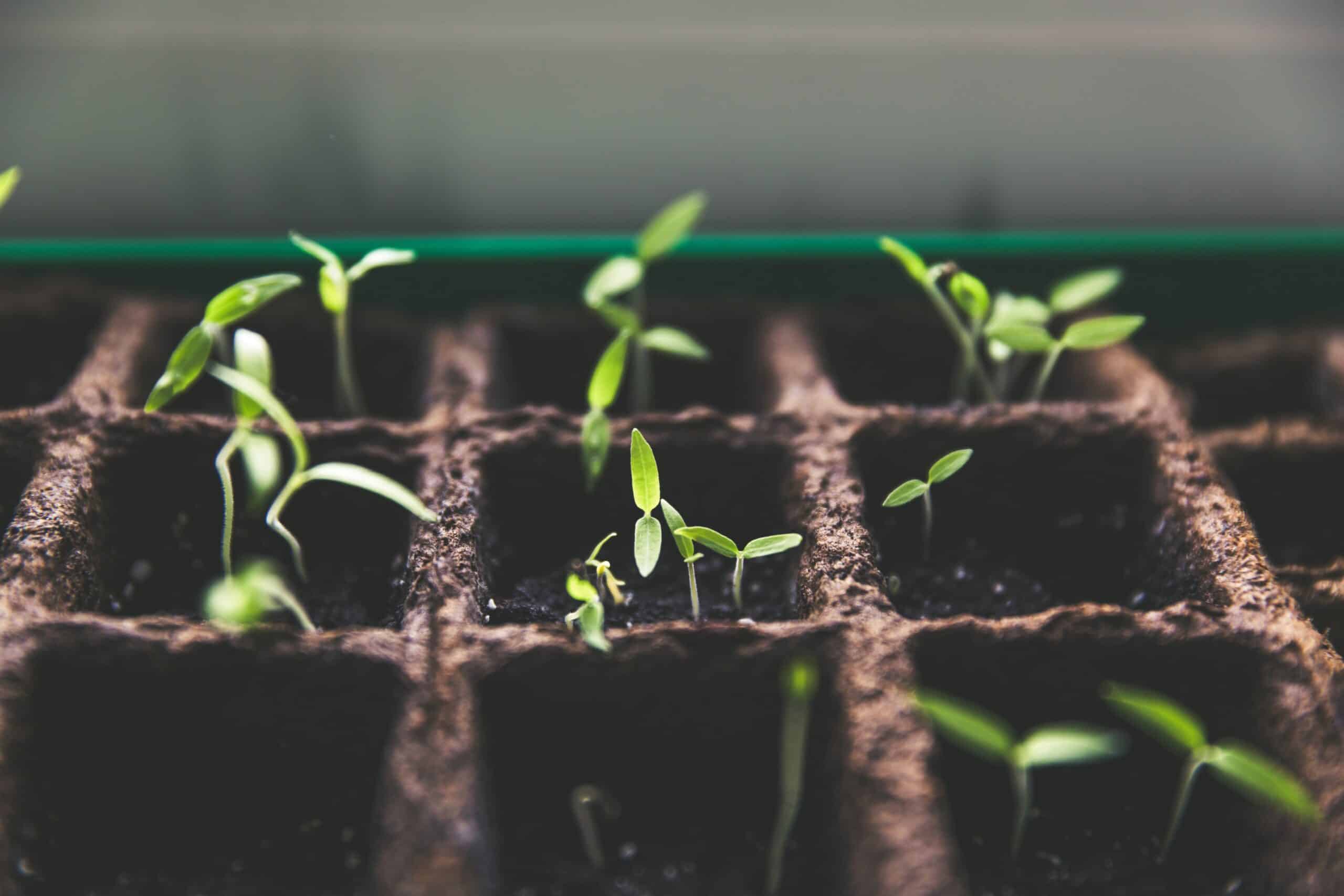
FAQ About Organic Fertilizer For Plants
Do you want to know more about organic fertilizers and how you can use them to help your plants? Here are some additional facts that can help you.
Organic vs. synthetic fertilizer – what are the differences?
Synthetic fertilizers are obtained from minerals and inorganic materials. They’re fast-acting, so they release the nutrients faster. Plants can take up the substances quickly, but the effects last for shorter periods. So, you’ll have to use them regularly to ensure your plants receive the proper support throughout their entire growth cycle.
The other significant difference between synthetic and organic fertilizers is their impact on soil quality. While organic products maintain a balance in the soil and encourage biodiversity, synthetic alternatives can harm the environment. They boost your plants but erode the soil and reduce soil life.
Last but not least, too much synthetic fertilizer can burn your lawn or garden, so you must pay attention to instructions of use and doses.
How can I make sure not to over-fertilize my plants with organic fertilizer?
Over-fertilizing with organic fertilizer is rare, as these products release nutrients slowly into the environment. However, it can happen if you add too much product regularly on small surfaces.
To avoid this scenario, you should:
- Read the instructions on the package if you buy fertilizer.
- Research plant needs to understand how much fertilizer is required for each surface if you use homemade fertilizer.
- Keep track of how much product you’ve spread on each surface to ensure you don’t do it too often.
- Test the soil to understand how much fertilizer it needs to support your plants.
How to add organic fertilizer to my plants the right way?
It depends on the type of fertilizer you’re using and the plants you grow. As a general rule, you want to follow the instructions on the package for products that need to be diluted in water or other substances.
If you make your compost, spread small amounts at a time, depending on the type of plants you grow. The other factor to keep in mind is the growth stage. Plants need fertilizers in different life stages, so you want to make sure you give them what they need at the right time.
As a general rule, you want to apply homemade fertilizer a month before sowing to give it time to decompose in the ground. Depending on the composition, 1-3 liters of product for each meter cultivated should be enough to secure enough nutrients for your plants.
How to create organic fertilizer for your plants with HomeBiogas product
With HomeBiogas, you can create Bio-fertilizer from your organic waste through a 100% environment-friendly process.
You’ll need a home composter that you can use in parallel with the HomeBiogas system to make sure you use 100% of the organic matter available. This way, you can use the organic matter not suitable for biogas production, such as chopped grass or citrus peels, to create fertilizer for your plants. Add the excess biofertilizer from the biogas production process to the compost pile to accelerate the composting process.
The product obtained in the home composter has all the macronutrients, micronutrients, and organic acids necessary for plants to thrive while also re-establishing soil balance for sustainable gardening.
To enrich your compost heap with the liquid biofertilizer produced by the HomeBiogas biodigester, follow the next steps:
- Instead of sprinkling water, sprinkle the biofertilizer on the above layers. The amount should be only enough to percolate to all layers; however, too much biofertilizer will affect the proper decomposition of the heap. A recommendation is to apply 1 L of biofertilizer per 1 m2 on a 0.15 cm layer of the compost heap.
- Apply biofertilizer every time you mix the compost heap.
When biofertilizer that has been produced in the biodigester is added to the compost heap, it enhances nutrients and microorganism activity, improving plant growth and health, increasing production, and enhancing the disease resistance of crops.
Summary
Organic fertilizers for plants help you grow healthy, robust plants with minimum impact on the environment. They are sustainable and eco-friendly products used to enhance lawns and gardens, making them a popular choice among homeowners and farmers who want to be self-sufficient and minimize their carbon footprint.
At the same time, organic fertilizers can be a cost-effective way to grow plants, trees, and shrubs, especially if you decide to make compost at home. In this case, a home composter can help you generate compost regularly to provide your plants and soil with the proper nutrients as often as necessary.
